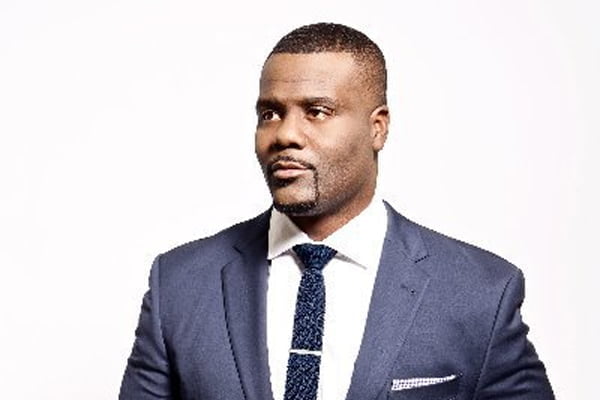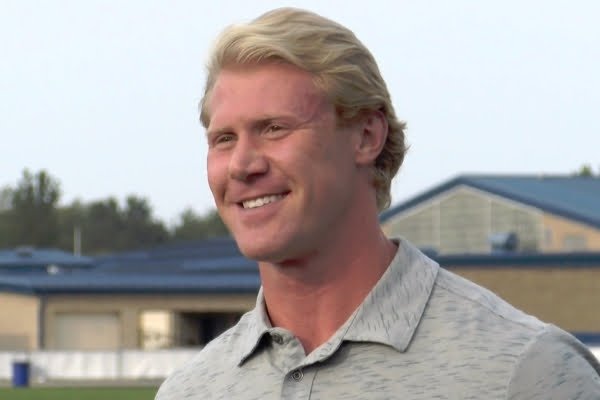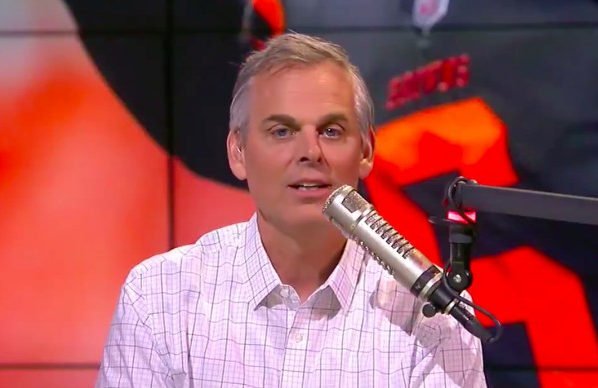I’d describe George Wrighster as a man that has controlled strength. He’s motivated by obstacles and driven by naysayers, but it isn’t written all over his face.
It’s a bit like Aaron Rodgers. The Green Bay Packers’ quarterback wasn’t visibly emotional when he slid to the 24th overall pick in 2005, or when his team drafted Jordan Love to possibly take his spot. Best believe Rodgers hasn’t forgotten about being slighted though. I think George is similar. The former NFL tight end is a competitor, but he might not let you see that your doubts ticked him off. He’ll just get back to work and grind so that one day you are eating your words.

George has achieved a lot in sports radio within a relatively short period of time. He can be heard on two national platforms — FOX Sports Radio and SiriusXM’s Mad Dog Sports Radio. His brand new show on Sirius began two short months ago. The Oregon grad shares some interesting thoughts about not being pigeonholed as a former athlete and also what it’s like to help change the landscape in a mostly white dominated industry.
I’ve known plenty of things about George, like how he rages against heavy metal music and trashes Velveeta cheese. Hey, we can’t all be perfect. But the Oregon grad touches on many things that aren’t common knowledge. George shares a wise thought about building a community. He unveils what got him listening to sports radio in the first place when he never listened during his playing days. George talks about the show that freaked him out the most and also shares a list of his strong goals. Makes sense though. It’s his controlled strength at work again. Enjoy.
Brian Noe: How’s everything going with the new gig at Sirius?
George Wrighster: It’s going really good. I got a chance to do a couple of special projects too. I did an MLK special with Kirk Morrison and some stuff with the college football national championship. I hosted some other shows on the network. It’s cool getting more opportunities and more reps, trying to get better.
BN: What’s the main goal you try to accomplish when doing shows, especially your new one?
GW: I want people to feel educated and entertained when they listen to the show. It’s important to me that people also feel like this is a place where they can get the truth and honesty and not just shtick. As you know, it’s easy to just pump out hot takes. But when it’s actually something that you believe and you can support it with some stats and data or personal experience that makes it believable. I think that’s the best thing that you can do. We all see sometimes where people say things and you’re like there’s no way this dude believes that. He’s just saying it because it’s going to get people riled up.
I try to talk about stories in a different way that people normally may not. I try to approach it from the human side of things and not get too far deep in the weeds on the X’s and O’s, but kind of how athletes are real people; how these things impact their sport and their decisions. We also talk a little politics on the show — how politics and business intersect sports in certain aspects too. We’re not debating propositions. No, we’re not doing all that, but we are at that intersection where sports does intersect with politics and business. We do go there.
BN: What do you remember most about your first show on Sirius?
GW: It’s funny because as many shows as I’ve done — solo, with other people, all of that — I remember the first night that the light came on and it was just me. I was nervous that entire day, dude. I went walking around the neighborhood because I would take the baby on a walk every day. I was nervous that whole day. I was like oh my God, what if when the light comes on, I can’t say anything? Nothing comes out?
It’s funny to think about because you’ve done it so many times, but the fact that it was all on me, it was my show, solo, it just hit me like, dude, I’m responsible for this whole ship. But the good part is, I was like if the ship sinks, if the car crashes, it’s going to be because I gave it everything that I had and it just didn’t work. It’s not going to be because I let somebody else control my future.
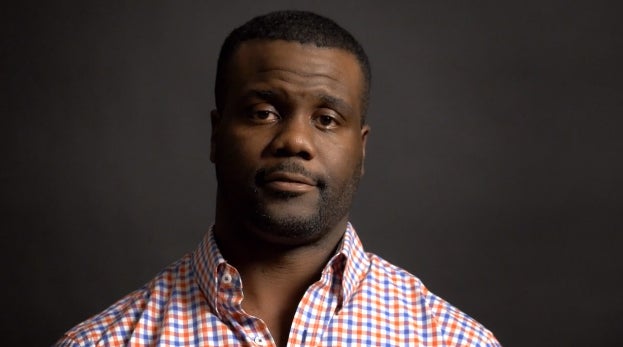
BN: What happened once you cracked the mic that first night?
GW: Every show has different clocks, how long each segment is and all of that. Our first segment for the opening monologue is between 15 and 22 minutes max. It was funny because that first 20 minutes, or however long I went, it felt like it was two hours long. It was crazy to me because I record my podcast sometimes for 30 minutes straight with nobody talking to me. It’s just me talking to the camera because I do it on a live stream, nobody responding, not taking comments, so it was just funny that it felt so long when I had to do it all by myself. But now it breezes by.
BN: How did that opportunity come about for you at Sirius?
GW: This was years in the making. This is where you say relationships matter and keep banging on the door and then one day it might open. Back in 2014 I finally got into the NFL’s broadcast boot camp. That’s where former and current NFL players can go get media training and get in front of executives. There are executives and actual decision makers from FOX, from ESPN, CBS, a bunch of places, and former athletes who have made it. You get a lot of workshops and they teach you how to interview. They expose you to TV and radio because a lot of times people don’t know which lane they want to be in or if they truly want to be in it. So you get big exposure.
When I got back from it one of the people that I met there was Steve Cohen. Not the Mets’ Steve Cohen, but the Steve Cohen who, at that point in time he may have been the program director or Senior Vice President over at Sirius. I just followed up with him. Every six months, four months I’d shoot him an email telling him what I was doing, letting him know I was available if anything came up.
Fast forward about four months ago, I got an email from Steve Cohen. He was like yo, we may have an opening over at Sirius. What are you doing now? That was weird because I hadn’t emailed Steve in a few months, but I was going to email him soon. I keep these reminders to email all of these people. All of these times he was always like yo George, I’ll keep you on the radar if anything comes up. He sent that e-mail, followed up, and then I tested. Apparently I did pretty well. They offered me the job and here we are.
BN: Was the test a demo or a fill-in show?
GW: It was a demo because they do things a little bit different over at Sirius. If you’re not under contract with them or don’t have an agreement with them, doing an on-air demo there doesn’t happen, I don’t believe. We did it just like an actual show. We produced an actual show except for it was only an hour and a half long. We took breaks; so I had to talk to commercial break and interview guests. And yeah, we did it like a mock show.
BN: What was it about sports radio where you said you know what, this is the road I want to go down?
GW: I’ve done TV, and I do want to do more TV as well, but radio allows you to communicate with people in a different way. In TV you’re speaking in sound bites a lot more. You don’t get a chance to expound, not as much storytelling. With radio you get a chance to build an audience and communicate with them. They become part of your family, part of building a community.
I saw that with a guy out here in LA named Fred Roggin. Fred just builds a community with his family. It’s the same thing with Petros Papadakis on his show Petros and Money. They build a community and the people are so invested. I like that. The idea that you don’t just build a community for that station; you build your community. So when you do move locations or you do change because it’s business — sometimes contract disputes happen, sometimes companies are bought and sold or whatever — then your audience is portable because that’s your family.
BN: When you talk about community, it makes me think about race. Sports radio is a very white dominated industry. As a black host, do you have that at the forefront of your mind that if you do a good job, it might open the door for others?
GW: Absolutely. I look at this as a two-fold thing. Yes there is a racial element and I’ll talk about that next, but the first thing is as a former athlete, they will pigeonhole you as just the sport that you played. That’s the first thing. I started writing to make sure that didn’t happen. Writing on other sports, commenting on other sports and all of that.
As an athlete I didn’t want to be pigeonholed into just football, and also pigeonholed just as an analyst. When you can host the show and be an analyst it opens up more doors for you. So now I don’t have to sit in the two chair. I can sit in the one chair also. It just gives you more diversity. As a former athlete, opening up doors as being a solo host, that’s hard to do.
But as far as a host of color, especially those who sit in a single chair, that’s tough. There aren’t a lot. There are a lot more who do two-man shows, and mind you they do a great job, but I think there is something to be said about the lack of diversity. Colin Cowherd obviously is one of the best to ever do it. So are Dan Patrick and Jim Rome. My goal is to ascend to that level the way some little kid can look at me and say oh wow; I can do this if I want to.
BN: I interviewed LaVar Arrington. He called it having a babysitter when the radio guy is in the one seat and the former athlete is in the two seat. His thought was hey man; two athletes can have a good show too. What are your thoughts on how the former athlete is typically paired with the radio guy?
GW: Yeah, he’s right. LaVar is right when he says that it’s like the babysitter, or the hall monitor where that person has to be the quote-unquote adult in the room. Truthfully it’s literally about the mechanics — tossing to break, watching the clock, understanding how to progress a story, how to manage callers — all the mechanics. That was something that I always pressed. Even when we started doing the show on FOX, I was like yo, I want to have more responsibility on the show. I think that once people see that you want that responsibility, and that you actually will take it seriously, and that you’ll go practice it when nobody’s listening, and then when you get the opportunity you do a good job at it, then they say oh okay, let’s throw him a bone.
Eventually something bad happens. I remember one day on FOX during the Sunday show I do now with Dan Beyer, something happened to Dan’s mic or it was a power issue or something, and he was out. I had to do it for a couple of segments and it was like, oh okay, cool, so now we know that he can do this. The more and more that you do it, then people can believe and trust because the thing that they want the most is to know that you’re not going to burn the house down. That it’s not like Home Alone where you’re going to come back and the house is ransacked or Don’t Tell Mom the Babysitter’s Dead where you’re going to have a party. No, you’re just going to go in there, live life like normal, put out a good show that’s entertaining, and everything will be fine.
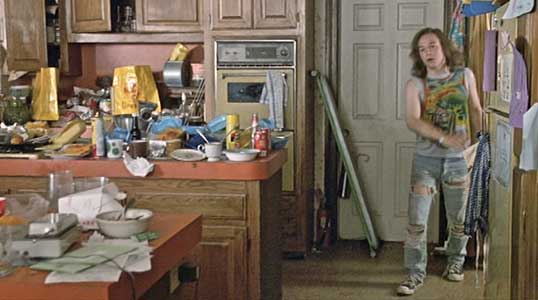
BN: Did you listen to sports radio much during your playing days?
GW: Absolutely not. No. Not at all. The thing that started getting me to listen to sports radio was Marcellus Wiley because I had played with him. We were friends, and I just wanted to support him. Then I realized, good God, I love sports radio.
My kids sometimes get annoyed, they’re like dad, do we have to listen to talk radio today? They already know that if it’s 12 o’clock here at home, I’m probably listening to Finebaum. I don’t know why I like Finebaum so much especially during college football season. Schein On Sports. I watch Colin. I like Skip and Shannon. I tune in to Steven A. sometimes. I appreciate how much work they really put in. Yeah it’s easier when you have an army of writers and staff and researchers, but you still have to go out there and deliver it.
BN: Is there anything else about sports radio in general beyond hot takes that turns you off for you when you listen?
GW: I usually only listen to people that I like. The only thing that makes me change the dial now is if it’s a topic that I don’t want to hear about, or I’ve felt like I’ve heard too many times. I’ll turn the dial, but I like this person, so I’ll be back. It’s just I’m tired of you today. I love my kids but some days I want to go to dinner all by myself, or with my wife and leave them at home. That doesn’t mean I don’t like them, but I need a break.
BN: Who have you learned the most from in sports radio?
GW: Dude, easy answer, this guy named Brett Winterble who I hosted my first show with on The Beast 980 here in LA. Brett had been a producer for conservative talk radio but he was a huge sports fan. He was the adult in the room.
Brett actually now has a huge talk show in North Carolina. He just filled in for Rush Limbaugh and had like the highest ratings for any fill-in there. Brett literally had been through the grinder of ascending in this business. We had a producer that was absentee at best. Brett taught me how to produce a show, how to cut sound, how to come up with content. He taught me things that if I were in a normal situation with a producer and all that stuff, they would have done a lot of that work already, so I wouldn’t have learned how to do it as quickly. It would have taken me years to learn something I learned in eight months because it was a crash course. It was either fail or do it.
Brett was just the consummate professional, freaking hard working, just a grinder. He’s just a smart guy too. He showed me the ropes in this business. He gave me a lot of valuable tools and experiences from his life that I wouldn’t have ordinarily gotten. I owe a lot of credit to Brett.
BN: You’ve had a number of partners. Have you taken elements that you think work from those other hosts and molded it to your own style at all?
GW: I would say yes. From Brett I learned that this was his livelihood. He was always the adult in the room. He was always going to make the right decision for the show. To make sure that things did not go off the rails. I took that from Brett.
Oh, I forgot somebody else I learned a lot from was Petros. Petros is just Petros. I think that a lot of times when people get into this business — and I fell victim to it too — of I have to be radio guy. I have to be TV guy when the thing that people really connect with the most is you being you. That’s what Petros showed me was just be you. You don’t have to be anybody else; just be the best George that you can possibly be. I don’t know if there’s anybody more themselves than Petros.
BN: Goals. Is there anything specifically that you want to accomplish in sports radio or beyond?
GW: Yes. I would like to have a simulcast like Colin does. Be number one on the Talkers 100. What that would mean for me, it would be a sense of accomplishment in my second career doing something that wasn’t so physical like sports. Doing something that was foreign, working at it, and then reaching that goal.
I do want to have a simulcast with radio and TV at the same time. But my ultimate goal, if I could be doing either my radio show or a podcast version of it like Joe Rogan does, while hosting a show on the Food Network and College GameDay on the weekends, I would be the happiest person in the whole world.
Brian Noe is a columnist for BSM and an on-air host heard nationwide on FOX Sports Radio’s Countdown To Kickoff. Previous roles include stops in Portland, OR, Albany, NY and Fresno, CA. You can follow him on Twitter @TheNoeShow or email him at bnoe@premierenetworks.com.




